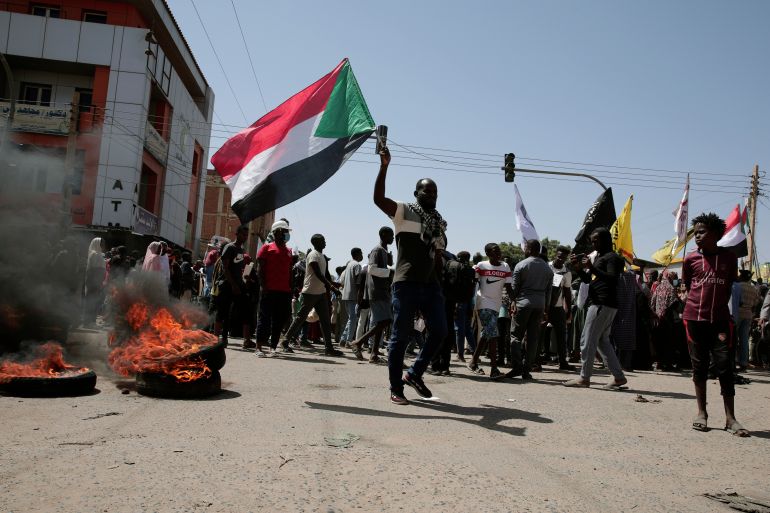Sudan police kill protester in anti-military demonstrations
Mazjoob is the 125th protester killed in weekly protests launched after the October 2021 coup.

Sudanese police have admitted a protester was shot and killed by its forces during a demonstration against military rule near the capital on Tuesday.
Police said the shooting was an individual action that went against orders and that “necessary legal procedures” had been immediately taken against the policeman involved.
Keep reading
list of 4 items20 years since war began in Sudan’s Darfur, suffering continues
Russia’s Lavrov visits Sudan on diplomatic push in Africa’s Sahel
Sudan should not settle for anything other than true democracy
“We saw the video that was widely circulated, including the falling of one of the protesters due to the behaviour of one of our police officers, and we confirm here that the police had taken all the necessary legal procedures against him,” the police said.
“We also stress that this was an individual behaviour that was rejected by the police and against the orders we had given to our forces on the ground.”
The protester, identified as Ibrahim Mazjoob, was killed in the Sharg al-Nil area near Sudan’s capital. He became the 125th protester to be killed in weekly protests that launched in the wake of the October 2021 coup which plunged the country into crisis.
“The martyrdom of the revolutionary Ibrahim Majzoob is another crime added to the crimes of the police, the coup authority and its military council,” the Central Committee of Sudanese Doctors said in a tweet on Wednesday.
The demonstrations against the military and economic woes have been met by a violent crackdown with hundreds of activists also being rounded up under emergency laws.
Police fired tear gas at protesters marching towards the presidential palace in Khartoum and neighbouring Omdurman on Tuesday, witnesses were quoted as saying by Reuters news agency.
Khartoum State police said in a statement that they were investigating the death and that protesters had been “aggressive” towards police, using tear gas, rocks and Molotov cocktails, and injured several policemen.
The protests come as military leaders who took over in the coup are negotiating a deal with the civilian political parties previously in power to restore a civilian government.
Most recently, tensions have emerged within the military, with army leaders demanding a clear timeline for the integration of the paramilitary Rapid Support Forces as well as a wider group of participants in the negotiation.
Leaders of the Rapid Support Forces have denied the desire for any tension with the military and said they are committed to forming one army.
The resistance committees, who have organised the weekly protests, have rejected the talks as elite dealings, and demand the complete withdrawal of the military from power.